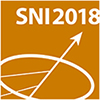Speaker
Description
Neutron diffraction on a triple-axis spectrometer and a small-angle neutron scattering instrument is used to study the magnetic phase transition in tetragonal Ba$_2$CuGe$_2$O$_7$ at zero magnetic field. In addition to the incommensurate cycloidal antiferromagnetic (AFM) long-range order, we establish that weak incommensurate ferromagnetism (FM) also arises below the transition temperature $T_N$ identified by sharp Bragg peaks close to the Γ point. The intensities of both the incommensurate AFM and FM Bragg peaks vanish abruptly at TN, which is indicative of a weak first-order transition. Above $T_N$, evidence is presented that the magnetic intensity within the tetragonal $(a,b)$ plane is distributed on a ring in momentum space whose radius is determined by the incommensurate wave vector of the cycloidal order. We speculate that the associated soft fluctuations are at the origin of the weak first-order transition in the spirit of a scenario proposed by Brazovski. [1]
[1]Phys. Rev. B 96, 134409 (2017)

